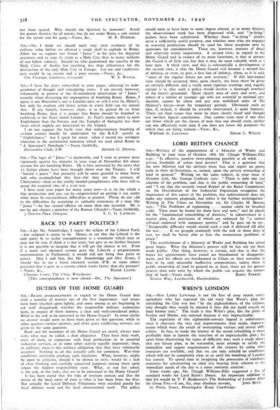DUTIES OF THE HOME GUARD
SIR,—Recent pronouncements in regard to the Home Guard deal with a number of matters not of the first importance : real issues have been touched upon lightly, and some among us are beginning to ask with disquietude whether the responsible military authorities have, in respect of these matters, a clear and well-considered policy. What is the task to be entrusted to the Home Guard? In some circles no answer would seem to have been given to this question, while in other quarters various answers, and often quite conflicting answers, are given to the same question.
Rank and file members of the Home Guard are nearly always men with, what may be called, a dual allegiance. They have their work, most of them, in connexion with food production or in essential industrial services, or in some other activity equally important; then, in addition, there is this military obligation that they have voluntarily accepted. Nothing in all this actually calls for comment. War-time conditions inevitably produce such situations. What, however, might be open to criticism, should it be shown to exist, would be a lack of clear thinking and carefully conceived purposes among those upon wham the highest responsibility rests. What, as one has asked, is the task, or the tasks, that are to be entrusted to the Home Guard?
It has been stated that the risks of invasion remain and that the duties of the local corps of men is what it has been from the first. But actually the Local Defence Volunteers were enrolled purely for local defence work and for local observational work. The policy
would seem to have been in some degree altered, as in many districts the observational work has been dispensed with, and "in-lying" pickets have been substituted. Whether these "in-lying" pickets serve a sufficiently useful purpose, and whether men who are engaged in essential production should be used for these purposes may be questions for consideration. These are, however, matters of detail and relatively minor importance. A second view, in regard to the Home Guard and in respect of its main functions, is that at present the Guard is of little use, but that it may do most valuable work at a later date. A third view, and this is substantially a development of the second view, is that the Home Guard will become a second line of defence, or even, in part, a first line of defence, when, as it is said, "most of the regular forces are sent overseas." If this last-named view should be accepted, then, quite dearly, the force must be given an entirely different and a vastly more rigorous training; and, equally certain is it, that such a policy would involve a thorough overhaul of the force's personnel Quite clearly men of sixty and over, and others of a similar or younger age who are essential to national pro- duction, cannot be taken and put into mobilised units of His Majesty's forces—even for temporary periods. Obviously such an idea, if, indeed, it should be actually entertained, is quite fantastic. There are then issues that must be more clearly faced and thought out to.their logical conclusions. One cannot train men if one does not know which are the classes of men that one should train, neither can one effectively train men if one does not know the purposes for which they are being trained.—Your.., &c.,


























































 Previous page
Previous page